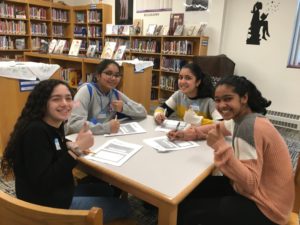
Editor’s note – This story refers to an event that occurred before the schools shut down due to the coronavirus mandate.
By Lauren Schiffman, Contributing Writer
Westborough – Last month, select seventh and eighth graders at Sarah W. Gibbons Middle School were asked some fairly difficult questions: What’s it like to be part of a group? What’s it like to be a bystander? Are all stereotypes true? Is all peer pressure bad? What is bias, and what does it look like?
It was part of The Playbook Initiative, a program developed in collaboration with the Boston Celtics Shamrock Foundation and the nonprofit Project 351, through which “ambassadors transform communities, elevate kindness, advance social justice, and gain the courage, compassion, and capabilities to lead change,” according to the Project 351 website.
Gibbons is one of only 15 schools in Massachusetts that was chosen to participate in The Playbook Initiative.
Westborough High School senior and Project 351 program ambassador, Johanna Pellegrino, opened the day by telling 57 students – all of whom were nominated and accepted participation in the program – that today, more than ever, student leadership is important.
Pam Pellegrino, Gibbons’ Grade Seven School Counselor, added that participants have “some capacity to grow, become an influencer, a changemaker.”
The opening exercise, a large-scale group game of rock, paper, scissors, had students questioning whether they enjoyed others’ attention or if they felt pressured. They were asked what it felt like to cheer on their friends. Answers varied from “fun” to “it felt like I was being a ‘follower.’” Other reactions included feeling good to support and encourage a friend. Participants were very engaged in the discussion, which touched on peer pressure and its impacts.
Another discussion addressed stereotypes, about which students said, “Not all stereotypes are true.”
“‘Playbook’ gives students a structure and a voice to discuss without judgment the important topics of their time. Imagine if every student was told, ‘your voice matters, and I want to hear your opinion,’” said Pam Pellegrino.
“Playbook takes this to the next level… and asks students to consider how one small voice – theirs – or one small action – theirs- can change their society for the better.” She added that she hopes the students feel that they can create change… (and) be an upstander.
Throughout the exercises, students were engaged, spoke up and spoke out about what they believe to be true when it comes to tackling the tough issues of their lives.
Eighth-grader Anna Neshcheretnaya said, “Everyone has judgments of other people,” but added that it’s more appropriate to form an opinion “once you get to know a person.”
Dhruv Shenoy, another eighth grader, added that he hopes to be an upstander “to help the community.” His biggest takeaway is that “stereotypes are uncomfortable. It’s not okay to stereotype. Don’t label someone if you don’t know them,” he said.
The program was an effective way to bring real-life issues into the classroom to be discussed, dissected and addressed. It helped students prepare for their futures and provided them with tools to support their peers.
“Students were able to talk about the impact of bias, what issues stereotypes can create, and how to address these issues while navigating the tricky social situations of middle school. I was blown away by how they were able to figure out creative and realistic ways to address these issues and make an impact through being an upstander,” said Johanna Pellegrino.
















